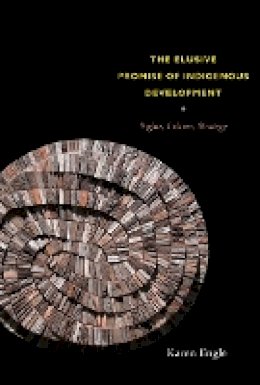Karen Engle is the Cecil D. Redford Professor in Law and the Director of the Bernard and Audre Rapoport Center for Human Rights and Justice at the University of Texas School of Law. She is an editor of After Identity: A Reader in Law and Culture.
“Engle argues that indigenous rights advocates should abandon essentialized cultural conceptions and move toward ‘a more nuanced (and more ‘real’) understanding of culture’. That attenuated understanding, combined with a measure of strategic creativity, may yield more productive results for indigenous self-determination. With this impressive and truly interdisciplinary approach to international law, historians, anthropologists, and lawyers alike can appreciate Engle’s account of indigenous rights advocacy and move toward a more complex strategy that successfully integrates culture.” - Giselle Barcia, The Yale Journal of International Law “[A] deeply insightful and beautifully crafted volume. Engel shows that several polarities are oddly linked, as in a Mobius strip. Highly localized indigenous groups appeal for assistance and support from international actors and despite their low technology level deploy the Internet. Diversity and uniqueness are pursued in the languages and styles of the West. Emphases on culture and the economic intertwine. Global and local fascinatingly blend. These complexly linked polarities give her narrative a haunting grandeur.” - Charles Crothers, Ethnic and Racial Studies “Engle’s work helps to illuminate the complexity of indigenous politics and inter-institutional dynamics. Her book contributes to discussions of indigenous rights an enlightening dynamism that I hope will inspire further work on the politics of indigeneity.” - Kirsty Gover, Melbourne Journal of International Law “The Elusive Promise of Indigenous Development takes the analysis of indigenous rights advocacy and the politics of self-determination to a new level, and it brings legal and cultural struggles together in a breathtaking big picture. It is up to the moment in terms of its political scope, richly historicized, and filled with comparative and critical analysis for rethinking indigenous political movements and their enduring (and sometimes problematic) implications.”-J. Kēhaulani Kauanui, author of Hawaiian Blood: Colonialism and the Politics of Sovereignty and Indigeneity “Could culture be, in part, the culprit? This question will not be well received by those interlocutors-activists, scholars and activist intellectuals alike-who are unwilling to subject the premises of their work to sustained critical scrutiny. For the others, Karen Engle’s text will be immensely rewarding: an invitation to take stock of how far indigenous struggles have advanced over the past four decades, with ‘right to culture’ at front and center, and a call to reflect on the limitations of this political-legal approach. She argues that the ‘right to culture’ has indeed become part of the problem, and that an alternative ‘anti-essentialist’ notion of culture could deliver more favorable political results. These are crucial assertions to engage and assess, for those on the front lines of indigenous struggles and, by extension, for scholars as well. We are indebted to Engle for putting them on our agenda with such lucidity.”-Charles R. Hale, Director, Teresa Lozano Long Institute of Latin American Studies, University of Texas at Austin “If you are interested in indigenous rights, social lawyering, and the strange alchemy by which identity is transformed into right, you will want to read this book. Karen Engle has written a powerful history of the indigenous rights movement, which is simultaneously a meditation on the nature of identity and a primer on international legal strategy.”-David Kennedy, author of The Dark Sides of Virtue: Reassessing International Humanitarianism “[A] deeply insightful and beautifully crafted volume. Engel shows that several polarities are oddly linked, as in a Mobius strip. Highly localized indigenous groups appeal for assistance and support from international actors and despite their low technology level deploy the Internet. Diversity and uniqueness are pursued in the languages and styles of the West. Emphases on culture and the economic intertwine. Global and local fascinatingly blend. These complexly linked polarities give her narrative a haunting grandeur.” - Charles Crothers (Ethnic and Racial Studies) “Engle argues that indigenous rights advocates should abandon essentialized cultural conceptions and move toward ‘a more nuanced (and more ‘real’) understanding of culture’. That attenuated understanding, combined with a measure of strategic creativity, may yield more productive results for indigenous self-determination. With this impressive and truly interdisciplinary approach to international law, historians, anthropologists, and lawyers alike can appreciate Engle’s account of indigenous rights advocacy and move toward a more complex strategy that successfully integrates culture.” - Giselle Barcia (Yale Journal of International Law) “Engle’s work helps to illuminate the complexity of indigenous politics and inter-institutional dynamics. Her book contributes to discussions of indigenous rights an enlightening dynamism that I hope will inspire further work on the politics of indigeneity.” - Kirsty Gover (Melbourne Journal of International Law)

